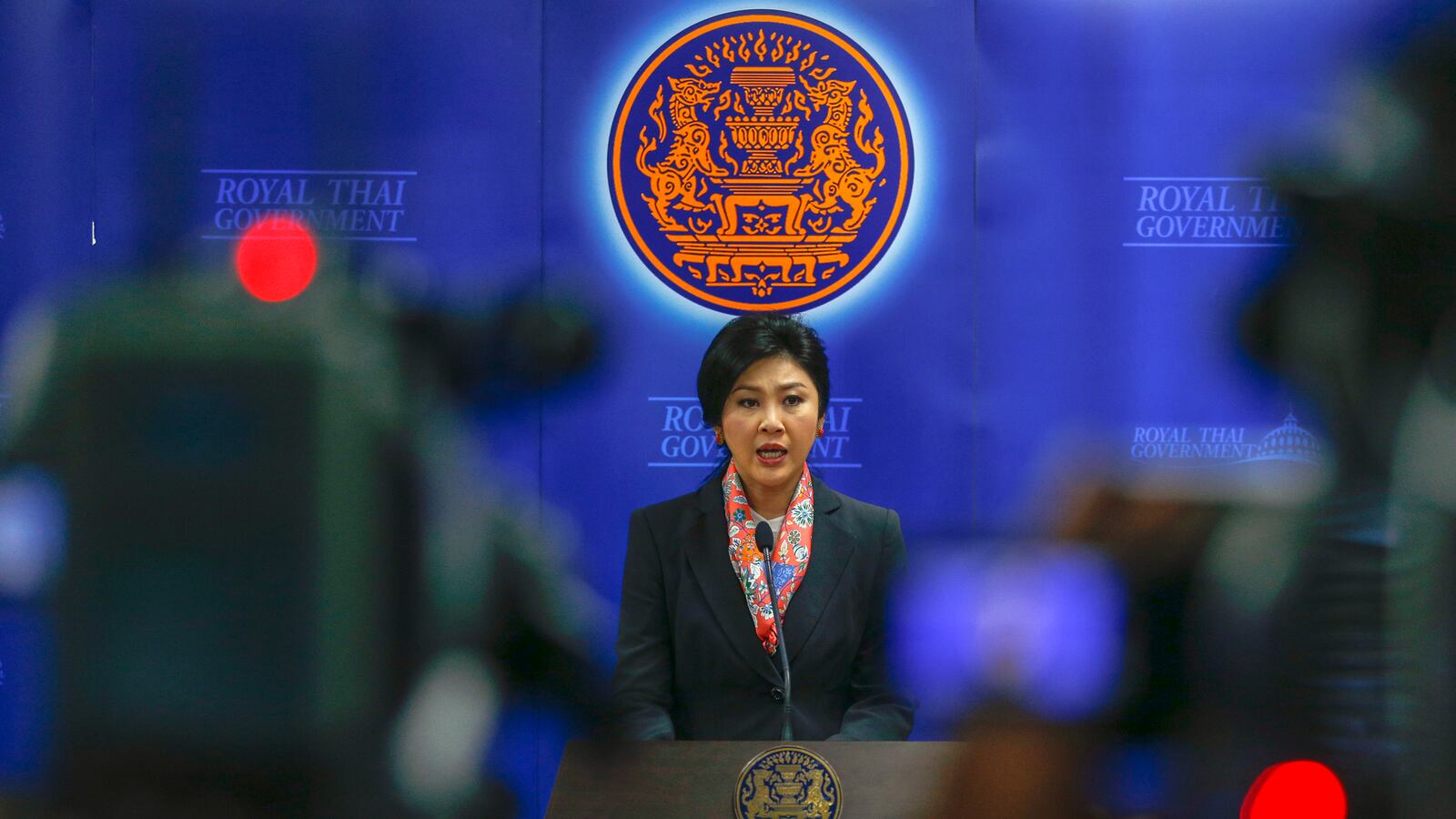Thailand’s Constitutional Court has declared that Prime Minister Yingluck Shinawatra must stand down, ruling that she violated the nation’s constitution when she transferred her national security chief to a different post. Critics say the widely expected ruling is the near-culmination of a “rolling silent judicial coup” underway for many months.

“The prime minister’s status has ended; Yingluck can no longer stay in her position acting as caretaker prime minister,” as one high-court judge put it.
The ruling comes weeks after the same court nullified the February 2 national election, which Yingluck’s Pheu Thai party was expected to win. The party won the last election, in 2011, routing the opposition Democrat Party. Ever since that 2011 victory, anti-government elements have been agitating to topple Pheu Thai. For six months now, protesters have clogged Bangkok’s streets, demanding that Yingluck resign and be replaced by an unelected “people’s council” that would develop “reforms” ahead of any new election. They insist she is merely a stand-in for her brother, Prime Minister Thaksin Shinawatra, who is reviled by the protesters and whom the army toppled in 2006.
Pheu Thai supporters, so-called Red Shirts, have largely refrained from confronting the anti-government crowds, but the court’s ruling is likely to send them into the streets as well, raising the prospect of violent, even deadly, clashes.
“This is a full-blown version of a judicial coup, with long-lasting impact on the balance of powers,” legal expert Verapat Pariyawong tells The Baily Beast. Previous rulings were among the principal reasons that led to the rise of an anti-Thaksin government and the 2010 massacre of the Red Shirts. “One can only hope that the political outcome will be different this time,” said Pariyawong. “But to be realistic, once the rule of law in the chamber is gone, all that is left is probably violence on the street.”
Red Shirts have watched with frustration as judicial moves steadily eroded Yingluck’s power, leaving in place a “caretaker” government that has little real ability to govern.
The ostensible cause of Yingluck’s ouster was her decision to transfer “illegally” the national security boss Thawil Pliensri, appointed before Pheu Thai won in 2011, to a less powerful job as an adviser in the prime minister’s office. Yingluck has rejected the charge as groundless and unfair. “I would like to deny all allegations I am accused of,” she testified this week. “As the prime minister, I am entitled to carry out responsibilities I have toward the people.”
“The question now is, will the current government without Yingluck be able to hold it together?,” Verapat says. The court made that job a great deal more difficult by ruling that nine other cabinet members associated with the transfer must stand down as well.
Almost everyone expected the court to rule against Yingluck. “They are dead meat for sure,” Thai businessman Songkran Grachangnetara told The Daily Beast when the court first brought the charge against the premier and Pheu Thai. Analysts predicted Yingluck would be crushed by enemies resorting to undemocratic tactics because they know they can’t beat her at the ballot box.
“An ‘iron triangle’ made up of the army, senior judges, and royalist supporters continues to deconstruct Thailand’s democratically elected government by means of a rolling judicial coup,” says a retired U.S. diplomat. “It is this iron triangle rather than the country’s electorate that determines who will govern here in Thailand. This iron triangle has deposed three democratically elected prime ministers since 2006 and is on the cusp of deposing a fourth.”
Thaksin enemies have now claimed that fourth scalp, perhaps bringing them closer to their goal of “eradicating” the Shinawatra family from Thai politics. They have justified their vendetta by accusing him of everything from treason, corruption, conflict of interest and authoritarianism to concealing wealth and insulting the revered King Bhumibol Adulyadej—a crime in Thailand.
But their animus more likely stems from the fact that the billionaire Thaksin successfully parlayed a populist agenda into broad popularity, especially in the rural north and northeast, that has allowed him and parties linked to him to win elections repeatedly. The so-called oligarchs have not won a national election since Thaksin’s first win in 2001.
His enemies are motivated by “a fear of Thaksin and the prospect of never winning elections under democratic rules. That scares them. It leaves the old elites powerless against future dominance,” Songkran says. “It’s also about money. Only by being in government can politicians make money. Being in government is very lucrative in Thai politics.”
Democrat Party leader and former premier Abhisit Vejjajiva has urged Pheu Thai to stop “fantasizing” about conspiracy theories but “the collusion is clear in my view,” says Songkran. “Independent bodies have not acted impartially.”
How did we get to this point? The tactics that led to Yingluck’s ouster can be reduced to a virtual primer on how to topple a democratically elected government:
• Stage massive protests. Last November the People’s Democratic Reform Committee launched huge anti-Yingluck demonstrations that culminated in the “shutdown” of Bangkok via the takeover of key intersections and adjoining streets.
• Try to spur a military coup d’etat. Protesters stormed army headquarters and sought buy-in from the military. They did not baldly call for a coup, but they did exhort soldiers to “take a stand.” Army chief Gen. Prayuth Chan-ocha insisted the military would remain “neutral,” a stance he has steadfastly maintained (against suspicions he and other generals support protesters behind the scenes).
• Isolate Yingluck’s Pheu Thai party. Democrat Party MPs resigned en masse from parliament in December, brushing off Yingluck’s offer of a new election. “We performed our duty in parliament as best we could,” Abhisit insisted. Pheu Thai and smaller parties could still pass laws, but those could be subject to charges of “illegitimacy” later.
• Maneuver Yingluck into dissolving Parliament. Suthep threatened nine major marches to converge on Government House, home to the prime minister’s offices, as part of a “judgment day,” and on December 9 the PM announced she would dissolve the lower house and hold new elections. The government floated February 2 as the election date. The marches went ahead anyway.
• Prevent Yingluck from administering the government. Protesters thronged Government House, home to the prime minister’s offices, forcing her to beg lodgings at the Defense Ministry and elsewhere. They took over or blocked access to government ministries, crippling the administration’s ability to function. Some 18 ministries have been forced to close so far.
• Battle Yingluck over her proposed new election. The PM clashed with the Election Commission, which argued that things were too chaotic for an election. The Democrat Party announced it would boycott the new vote, hobbling Pheu Thai’s legitimacy even if it won. Abhisit declared that an election would be the “same old power grab” by Thaksin forces. Some Yingluck allies assailed the Democrats for creating conditions for a military coup, noting that the party also boycotted elections in 2006, ahead of Thaksin’s ouster by the army.
• Nullify the election. With the army not taking the coup d’état bait, the putative iron triangle took the skirmish to the judges. The February 2 election was held, but protesters prevented millions from voting. More than two dozen precincts were unable to complete voting. The Election Commission refused to publish any results, and the Constitutional Court ruled the election null and void, saying it breached the constitution’s requirement that nationwide voting be completed in one day.
• Cripple Yingluck with “corruption” allegations. The National Anti-Corruption Commission accused the prime minister of “dereliction of duty” for ignoring warnings about corruption in a program that subsidizes rice farmers.
• Guarantee an impeachment mechanism. Thailand held a Senate election, with no objections from the Election Commission, nor from protesters who have vowed to disrupt any future lower-house election. The reason is simple: Almost half of all senators are appointed and most of those are Democrat Party supporters. Any Yingluck impeachment would have been heard in the upper house.
• Go after Yingluck in multiple venues. The Constitutional Court case against the PM was brought even though she was already being pursued by the anti-corruption panel. “In political terms, gaining a majority five votes on the Constitutional Court [was] more achievable than pursuing the [corruption] case that requires three-fifths of senators,” Verapat said presciently.
Now, the court’s removal of Yingluck could force a compromise in which Pheu Thai agrees to a political ban or some sort of “undemocratic but legal constitutional amendments,” Verapat says.
And with Yingluck defeated, her opponents have another card to play. Those determined to bring down the government altogether could create such chaos that the country would have to invoke Section 7 of the Constitution. This states that whenever no provision under the Constitution is applicable to any case, “it shall be decided in accordance with the constitutional convention in the democratic regime of government with the king as head of state.”
In other words, if Pheu Thai hangs on, kick the whole thing over to the palace.




